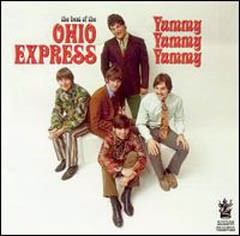Chew on This
Buddah label reissues bubblegum classics
By Greg Cahill
YOU CAN SCOFF, sneer, or turn a deaf ear, but bubblegum pop is a sticky part of the American cultural fabric from which you can never free yourself. Incessantly perky, often whimsical, and infused with a high fun factor, these summery songs just won’t go away. These days, you can thank the Mouse for a lot of the current crop of teen pop–the Disney empire is the breeding ground for many chart-topping pop princesses and boy bands. Britney Spear–who owes her success, in part, to porn filmmaker-turned-rock video director Gregory Dark–is a Mickey Mouse Club alum. Two members of ‘N Sync–singers JC Chasez and Justin Timberlake–both have roots in Orlando (owing their early success to the Backstreet Boys’ Svengali-like producer Louis J. Pearlman) and both were card-carrying Mouseketeers. Backstreet Boy Kevin Richardson served as a tour guide at Disney World. And pop princess Mandy Moore is another Orlando girl.
All of them owe a nod to the Monkees, AKA the pre-fab four, who were invented in 1966 by Burt Schneider and Bob Rafaelson, a team of TV producers who were looking to cash in on the madcap zaniness of the Beatles film A Hard Day’s Night. Now (surprise, surprise) the Monkees are back for their millennial edition. The band, sans Michael Nesmith, is touring Europe and the United States, and Rhino Records–which, as the All Music Guide once pointed out, treats the Monkees catalog with the respect usually accorded jazz great Charlie Parker–has just released yet another four-CD box set of Monkees alternate takes, The Monkees Music Box.
“Within the rock canon, the Monkees have the same problem as those tofu hot dogs you stumble across at the supermarket. They look like the real thing. With the proper accouterments, they’d probably even taste like the real thing. But deep down, you just know they’re not the real thing,” the Washington Post recently observed. “Never mind the fact that Monkees albums routinely featured session work by the likes of Neil Young, Hendrix drummer Buddy Miles, and Elvis Presley guitarist James Burton. Never mind that they scored four consecutive No. 1 albums in the ’60s–more than the Rolling Stones, the Who, and the Kinks combined (the Stones had one, the others none). And never mind that they earned enough respect from their peers that a Monkee, Michael Nesmith, joined Mick Jagger and Donovan as invited guests when the Beatles recorded ‘A Day in the Life.’
“All of which raises the question: Is it really a fatal flaw to be a fabricated boy band?”
Of course not.
IN FACT, it’s not even a fatal flaw to be a fabricated studio boy band. Case in point: the 1910 Fruitgum Co., a faceless studio assemblage created in 1968 by producers Jerry Kasentz and Jeff Katz for Buddah Records, just in time to cash in on the then fading Monkees phenom. The band’s 1968 hit “Simon Says” heralded the arrival of bubblegum pop. Now digitally remastered, The Best of the 1910 Fruitgum Co. (which includes their Top 10 hit “1, 2, 3, Red Light,” once recorded by the Talking Heads) has just been reissued by the newly revived Buddah label, along with The Best of the Lemon Pipers: Green Tambourine and The Best of the Ohio Express: Yummy, Yummy, Yummy, which includes their effervescent ode to oral sex and the countryish pop single “Sausalito (Is the Place to Be).”
That latter band shared vocalist Joey Levine with the 1910 Fruitgum Co., which disbanded in 1970.
But that wasn’t the end of bubblegum in your life–even if you don’t own any Mandy Moore CDs and avoid Britney like the plague. Levine is now a successful ad writer, whose “greatest hits” include the Almond Joy theme (“Sometimes you feel like a nut, sometimes you don’t”), “Just for the taste of it (Diet Coke)!,” and a dozen more popular jingles rattling around in your brain.
Resistance is futile.
From the April 19-25, 2001 issue of the Northern California Bohemian.









